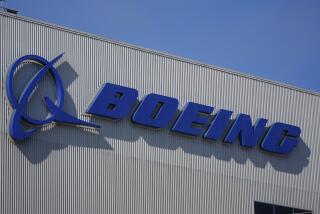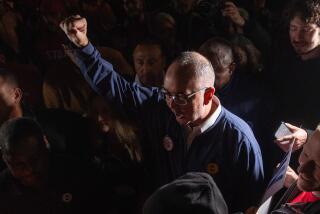UAL Board Backs Sale of Airline to Employees : Buyout: The offer totals $4.38 billion, but financing is not lined up. The firm’s chief executive would face firing.
- Share via
NEW YORK — UAL Corp., the parent of United Airlines, announced Friday that it will be purchased by its employees for $4.38 billion in a deal that will create the nation’s largest worker-owned company.
If the transaction is completed, shareholders will get cash and company IOUs valued at $201 a share. But employees, who must still ratify the agreement, will make some sacrifices; unions have promised $2 billion in wage and other concessions over the next five years. In exchange, they will own a full 100% of the corporation. The unions are likely to oust the current chief executive.
An ownership shift into the hands of employees will have an uncertain effect on the traveling public. But, if all goes as planned, morale and the level of service may rise as employees respond positively to the notion of working for themselves.
Agreement on the deal by a consortium of labor unions and the company’s board of directors was reached after an all-day, all-night board meeting that ended at 6:47 a.m. Friday.
It ended a months-long saga of bidding and counter-bidding that included a $6.75-billion offer last fall for the nation’s second-largest airline. That proposal, made jointly by management and some employee groups, collapsed when financing could not be arranged--sending the stock market reeling.
Financing could be a stumbling block in the current deal as well, some analysts believe. The announcement Friday by UAL and the United Employee Acquisition Corp., a company created especially for the takeover, disclosed that financing has not yet been lined up.
UAL stock closed down $2 a share at $163.50 Friday on the New York Stock Exchange, apparently reflecting uncertainty that the deal can be consummated.
“The financing for this transaction is no piece of cake,” said Edward Starkman, airline analyst with the New York investment firm of PaineWebber Inc. “I still have a lot of questions. We are not in a great lending environment, in general, and all you have is an employee group and no management.”
But John Peterpaul, vice president of the International Assn. of Machinists and Aerospace Workers, insisted that arranging loans will not be difficult. “We are very optimistic,” he said. “The banks look favorable.”
Under terms of the deal, for each share of UAL stock, shareholders will receive $155 in cash, $35 worth of UAL debt and one share of a new security issued by Covia Corp. Covia, which is half owned by UAL, operates United’s Apollo computer reservation system. UAL estimated that the Covia stock will be worth $11 a share.
The agreement puts an end to a threatened fight for control of UAL’s board by a New York investment group, Coniston Partners. Coniston--UAL’s largest shareholder, with an 11.8% stake--said it would help the unions in their efforts to acquire the airline.
“We are supportive of the transaction,” said Gus Oliver, a principal in Coniston. “It is a friendly deal. I think it is worth it for the unions to pay a bit more (for UAL) to get a friendly deal.” Oliver said Coniston’s holdings were purchased at an average price of about $160 a share. The group’s profit, he added, had not been calculated.
When completed, Peterpaul said, the sale “will benefit all the employees of UAL. It will ensure its viability.”
But some observers said that United will have a dangerously heavy load of debt if the sale is completed.
“Airlines should avoid leverage,” said Mark Daugherty, airline analyst in New York with the investment firm of Dean Witter Reynolds. “And that is especially true since they will have so much in the way of capital expenditures in the 1990s.” United operates a fleet of 431 airliners and has placed firm orders for 264 more.
Another question mark is who will run the employee-owned company. Peterpaul--along with Frederick Dubinsky, chairman of the UAL’s Air Line Pilots Assn. unit, and Diane Robertson, president of United local of the Assn. of Flight Attendants--said that, once the employee buyout is completed, UAL Chairman and Chief Executive Stephen M. Wolf, who opposed the deal, would be ousted. So would the rest of UAL’s current board of directors, they said.
Dubinsky said that the new board would consist of three members of the airline’s new top management, eight independent outside directors and four others, representing the three unions and the non-contract employees.
Wolf appears to have no intention of giving up control of the airline until the union’s purchase is consummated.
“Mr. Wolf has told employees he is committed to running the company as aggressively as he can for as long as he can,” Lawrence M. Nagin, senior vice president of corporate and external affairs, said in an interview.
The unions have some deadlines to meet if the deal is to be completed. Within four months, lenders must make commitments for half of the necessary level of financing. The entire transaction must be completed within eight months; that includes getting approvals from the Department of Transportation, the Justice Department and the Securities and Exchange Commission.
Wolf will turn over to the unions a far different company than the one he joined as chief executive in December, 1987. Wolf was lured to United from Los Angeles-based Tiger International, parent of cargo-carrying Flying Tiger Line, by a package that included stock-based incentives estimated at the time to be worth between $10 million and $15 million.
Under Wolf, United’s hubs were strengthened, it rose from being the No. 3 airline serving the Pacific region to No. 1, and it ordered $19-billion worth of new planes. On May 15, it will enter the European market for the first time.
The union concessions, totaling $2 billion over five years, would range from $300 million in the first year of employee ownership to $500 million in the fifth.
Pilots with more than five years at the company would make wage concessions of 11%; those with fewer years of service would give up 7%. Flight attendants and machinists would give back 7.69% if they have more than five years of service and 5% if they have less.
When fully implemented, the deal would give the pilots ownership of 37.9% of the new company, the machinists 35.7%, non-union employees 14.3% and flight attendants about 12%.
UAL has been in turmoil off and on for about three years. In April, 1987, the company’s pilots startled the industry by offering $4 billion for the airline, which was then a subsidiary of an entity called Allegis Corp.
Allegis also owned Hilton International Hotels, Westin Hotels, the Hertz rental car system and Covia, the computer reservation system subsidiary. Such diversification troubled the pilots, who said that the company’s strategy of being a one-stop travel shop was misguided. They sought to have Allegis concentrate on running the airline and divest almost everything else.
Pilots argued that their own careers were being jeopardized because Allegis was paying too little attention to the carrier and that the company was using airline profits to bolster its other businesses.
The pilots’ offer put ownership of the company up for grabs. Allegis Chairman Richard Ferris was ousted in June of 1987--to be replaced by Wolf--and the board agreed to sell the outside businesses to focus on running the airline. The proceeds of asset sales were used to make extra payouts to shareholders.
The name Allegis, coined by Ferris, was changed to UAL Corp. Today, UAL’s only asset, in addition to the airline, is 50% of Covia.
The asset sales placated the pilots to some extent, although they never actually withdrew their purchase offer, which lay dormant until late last year.
Things began popping at UAL again about nine months ago. Los Angeles financier Marvin Davis offered $240 a share, or $5.2 billion, for UAL last July. By August, he had increased the offer to $275 a share, or $6.2 billion.
Then, in September, a combination of UAL managers, United’s pilots and flight attendants, and British Airways made an offer to purchase for cash all outstanding shares of UAL common stock for $300 a share, or $6.75 billion. The machinists union did not join the buyout attempt, objecting to the heavy load of debt required.
When the financing for the proposed deal was reported to be in trouble last Oct. 13, the stock market took a tumble, with the Dow Jones Industrial Average dropping 190.58 points. The buyout offer officially collapsed on Oct. 27.
WORKERS REACT--Opinions differ, but most UAL employees want the issue of theairline’s future resolved. D1
EMPLOYEE OWNERS--Many employee buyouts of companies have led to better products and fatter profits. D1
ANALYSIS--James Flanagan says the big challenges at UAL involve people, not money. D1
More to Read
Inside the business of entertainment
The Wide Shot brings you news, analysis and insights on everything from streaming wars to production — and what it all means for the future.
You may occasionally receive promotional content from the Los Angeles Times.










